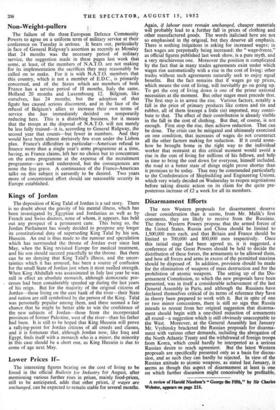Kings of Jordan
The deposition of King Talal of Jordan is a sad story. There is no doubt about the gravity of his mental illness, which has been investigated by _Egyptian and Jordanian as well as by, French and Swiss doctors, none of whom, it appears, has held out any prospect of a permanent cure. This being so, the Jordan Parliament has wisely decided to postpone any longer its constitutional duty of superseding King 'Talal by his son, Hussein. An end is thus made to the rumour and speculation which has surrounded the, throne of Jordan ever since last May, when the King revisited Europe for medical treatment, and his son should succeed peacefully to the throne. But there can be no denying that King Talal's illness, and the uncer- tainties which it has aroused, has been a source of confusion for the small State of Jordan just when it most neeaed strength. When King Abdullah was assassinated in July last year he was still in effect an absolute monarch, although democratic pro- cesses had been considerably speeded up during the last years of his reign. But for the majority of the original citizens of Jordan—those living on the east bank of the river—their State and nation are still symbolised by the person of the King. Talal was personally popular among them, and there seemed a fair chance that he might be better able to win the confidence of the new subjects of Jordan—those from the incorporated provinces of former Palestine, west of the river—than his father had been. It is still to be hoped that King Hussein will prove a rallying-point for Jordan citizens of all creeds and classes, and it is fortunate that, although Jordan now, like Iraq and Egypt, finds itself with a monarch who is a minor, the minority in this case should be a short one, as King Hussein is due to come of age next May.


























 Previous page
Previous page